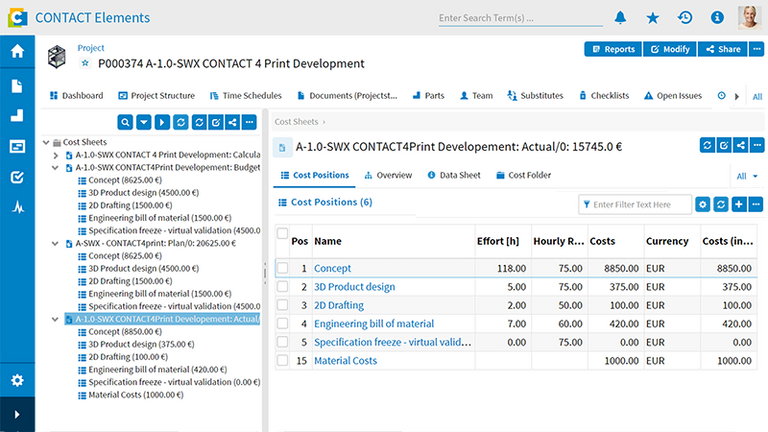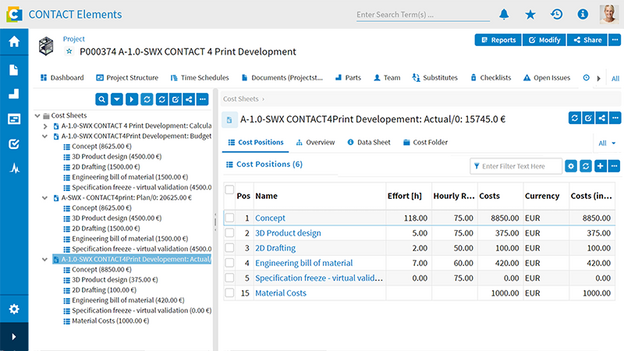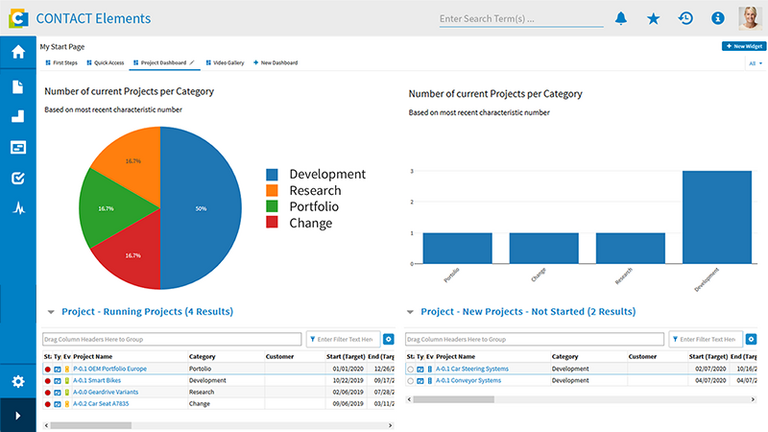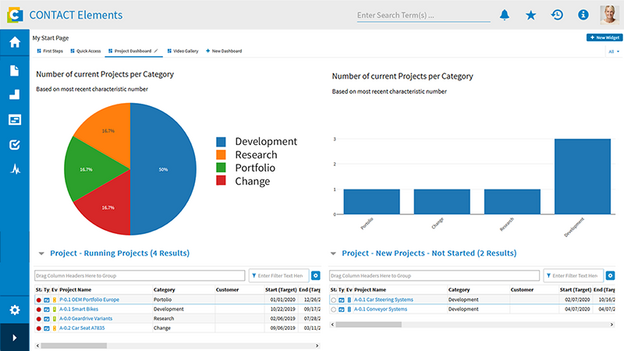Track project costs and reliably meet budgets
Transparent planning, tracking, and evaluation of project costs are among the core challenges in project management. Often, there is a lack of end-to-end processes to precisely record expenses, break down costs according to requirements, and keep an eye on current actual, planned, and target costs. Additional hurdles include media discontinuities during data transfer from ERP systems and a lack of synchronization with project tasks. CONTACT Elements Project Costing addresses these challenges with a solution that seamlessly integrates cost management into projects. It offers comprehensive analysis capabilities and ensures that your company reliably adheres to project budgets.
Benefits
- Record costs directly in the project and break them down as required
- Easily compare and analyze project costs in a clear and structured way
- Plan, calculate, and synchronize your efforts directly in the project

Record project costs and break them down as required

With Project Costing, you can quickly and easily record cost items using cost sheets. Their classification as budget, plan, or actual determines the significance of the included items. If you choose a cost type with hourly effort, the hourly rate can be automatically adopted from the cost center or site, or defined manually. The time period of cost incurrence can be freely entered or automatically synchronized with the project task. Project Costing also allows you to record cost items independently of the project schedule. Costs are broken down by cost type, cost center, and site. Additionally, these items can be structured and analyzed according to criteria like engineering disciplines or product components.
Record project costs and break them down as required
With Project Costing, you can quickly and easily record cost items using cost sheets. Their classification as budget, plan, or actual determines the significance of the included items. If you choose a cost type with hourly effort, the hourly rate can be automatically adopted from the cost center or site, or defined manually. The time period of cost incurrence can be freely entered or automatically synchronized with the project task. Project Costing also allows you to record cost items independently of the project schedule. Costs are broken down by cost type, cost center, and site. Additionally, these items can be structured and analyzed according to criteria like engineering disciplines or product components.

With Project Costing, you can quickly and easily record cost items using cost sheets. Their classification as budget, plan, or actual determines the significance of the included items. If you choose a cost type with hourly effort, the hourly rate can be automatically adopted from the cost center or site, or defined manually. The time period of cost incurrence can be freely entered or automatically synchronized with the project task. Project Costing also allows you to record cost items independently of the project schedule. Costs are broken down by cost type, cost center, and site. Additionally, these items can be structured and analyzed according to criteria like engineering disciplines or product components.
Compare and analyze project costs with dashboards

Cost sheet dashboards make it easier to track and evaluate project costs. The clear, intuitive interface shows all relevant information at a glance – from sheet properties to included items and associated activities. For effective cost management, target, plan, and actual costs can be analyzed and compared over time at any point. This is supported by tailored reports and insightful visualizations.
Compare and analyze project costs with dashboards
Cost sheet dashboards make it easier to track and evaluate project costs. The clear, intuitive interface shows all relevant information at a glance – from sheet properties to included items and associated activities. For effective cost management, target, plan, and actual costs can be analyzed and compared over time at any point. This is supported by tailored reports and insightful visualizations.
Cost sheet dashboards make it easier to track and evaluate project costs. The clear, intuitive interface shows all relevant information at a glance – from sheet properties to included items and associated activities. For effective cost management, target, plan, and actual costs can be analyzed and compared over time at any point. This is supported by tailored reports and insightful visualizations.
Plan, calculate, and synchronize efforts directly in the project
Work efforts are typically planned and tracked within the project tasks of the work breakdown structure. Project Costing allows you to synchronize these tasks with cost items at the push of a button. The efforts from selected tasks are thus directly incorporated into the cost breakdown. Captured actual costs – for instance, from an ERP system – can be automatically imported. For secure and seamless data exchange, Project Costing utilizes modern web services technology and offers interfaces to systems such as SAP, Psipenta, and IFS.

Work efforts are typically planned and tracked within the project tasks of the work breakdown structure. Project Costing allows you to synchronize these tasks with cost items at the push of a button. The efforts from selected tasks are thus directly incorporated into the cost breakdown. Captured actual costs – for instance, from an ERP system – can be automatically imported. For secure and seamless data exchange, Project Costing utilizes modern web services technology and offers interfaces to systems such as SAP, Psipenta, and IFS.

Project Costing is tool qualified for ISO 26262 standards
CONTACT Elements is tool-qualified by TÜV Nord in accordance with ISO 26262. In addition to the CONTACT Elements platform, the international technology expert has certified the products CIM Database for PLM and Project Office for project management, as well as Project Costing and a number of other CONTACT Elements software modules. With this certification, TÜV Nord assures that our software fulfills the requirements of ISO 26262 for standards for software tools for the development of safety-relevant properties.
Related Elements
Calculate product costs in development and optimize pricing
Use product structures as costing components
Define sales targets for optimal pricing and increase product profitability
Reliably adhere to project budgets by tracking costs as they occur
Track progress, improve performance and achieve targets
Define indicators for products, projects and processes to improve your performance
Specify target values for product attributes and record actions to be taken in the event of discrepancies
Keep an eye on your indicators and the success of actions taken at all times
Effectively combine project management and project execution
Easily create work breakdown structures from the appropriate project templates
Allow management, planning, and experts to work hand in hand
Combine work breakdown structure with results, resource, and quality planning
Further information
Would you like to find out more about this topic? Choose one of the following information offers.


